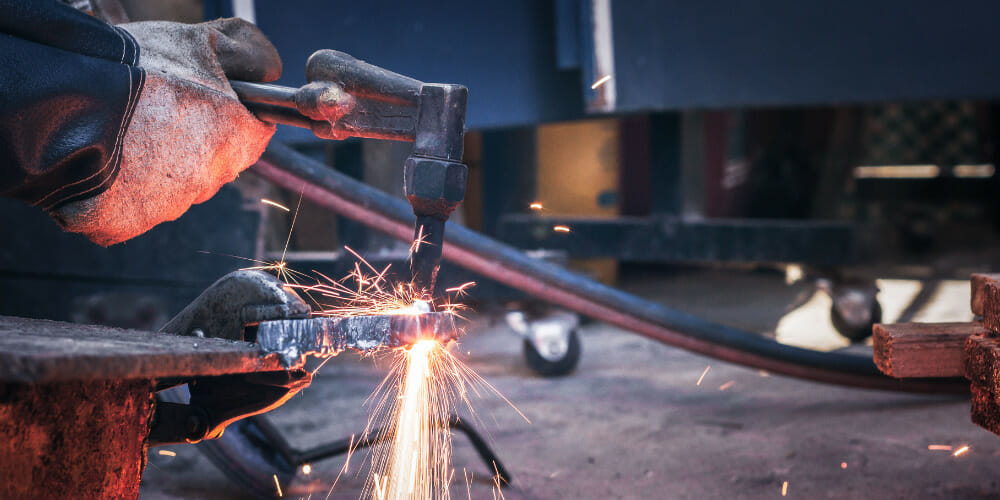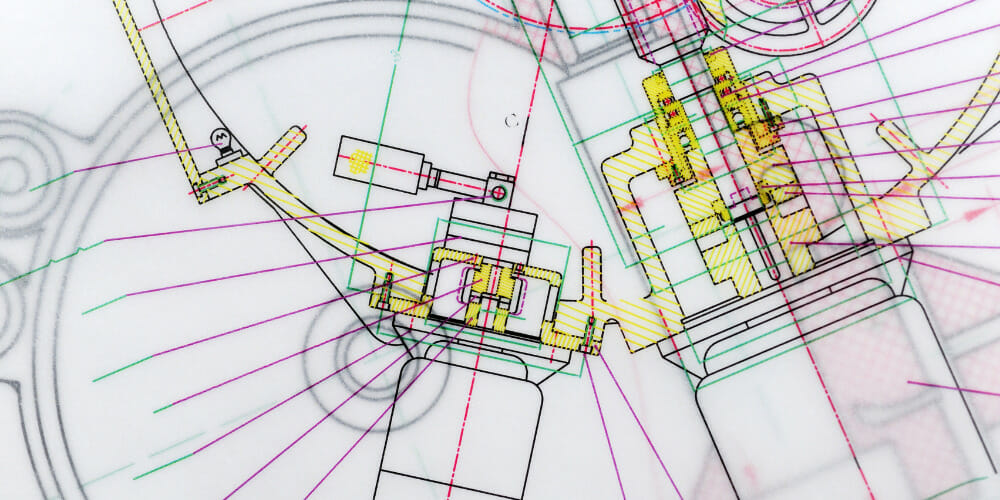The industrial machinery and components industry is a vital part of the US economy, responsible for manufacturing a wide range of essential products for businesses and consumers. This sector employs millions worldwide and is forecast to grow in the coming years. So, how many jobs are available in industrial machinery components?
According to the most recent data, there are over 2.1 million jobs available in industrial machinery/components in the United States.
There are many different jobs available in the industrial machinery mechanics and components industry, from entry-level to highly skilled positions. Whatever your skills and qualifications, there is likely to be a role that is right for you. If you are looking for a challenging and rewarding career, keep reading till the end!
US Industrial Machinery Industry
The US industrial machinery industry comprises establishments primarily manufacturing heavy machinery and equipment, such as metalworking, material handling, and textile machines. For example, the metalworking machines manufactured by this industry are used in the automotive, aerospace, and construction industries.
The industrial sector machinery is highly competitive, with many large multinational companies competing for market share. To stay competitive, companies in this industry must constantly innovate and offer reasonably priced, high-quality products.
The industrial machinery remanufacturing market size is expected to grow by $304.36 billion between 2021 and 2026 at a CAGR of 16.81%. The increasing demand for energy-efficient and environment-friendly products is one of the major factors driving the growth of this market.
The US industrial machinery industry offers good opportunities for growth and development. This growth will create new job outlook opportunities for skilled workers in this field.
Types of Industrial Machinery
Industrial machinery is any machinery or equipment used for industrial purposes. These can range from simple hand tools and machines to complex cybernetic systems. They are used in various industries, including manufacturing, agriculture, mining, construction, and many others.
Some examples of industrial machinery include:
Machine Tools
Machine Tools are used in a variety of manufacturing and production processes. They can be used to create or modify parts and products made from various materials. There are many different types of machine tools, each with its own specific function and purpose. Some common examples include lathes, milling machines, drill presses, and grinders.
Power Generation Equipment
Power Generation Equipment refers to the machines used for generating electricity. The most common type of power generation equipment is a power plant, which converts energy from another source into electrical energy. Other types of power generation equipment include generators, wind turbines, and solar panels.
Transportation Equipment
Transportation equipment includes all the vehicles and machines used for transportation, from everything from cars and trucks to boats and trains. The transportation industry plays a vital role in the economy of any country, as it helps move people and goods around.
Agricultural Machinery
There is a wide range of agricultural machinery that is used in today’s farms and ranches. This includes everything from small hand-held tools to large tractors and harvesters. Agricultural machinery has become increasingly sophisticated and efficient, helping farmers to increase productivity and improve the quality of their products.
Construction Machinery
Construction Machinery is a category of machines used for construction tasks such as demolition, digging, and earthmoving. Construction machinery can be powered by gasoline, diesel, or electricity.
Manufacturing Machinery
There is a wide range of manufacturing machinery available to help businesses produce products. This machinery can be used for everything from creating small parts to assembling large products.
Metalworking Machinery
Metalworking machinery is any machinery or equipment used for working with metal. This can include cutting, shaping, and joining metallic parts. It can be used in various industries, such as automotive, aerospace, construction, and many others.
Some examples of metalworking machinery include:
Lathes
Lathes are one of the most important machine tools in a metalworking shop. They are used to remove material from workpieces, create cylindrical shapes, and produce smooth finishes. There are several different types of lathes, each with its own strengths and weaknesses. Selecting the right lathe for a particular job is essential for getting the best results.
Operating a lathe is not difficult, but it does require some practice to master the various techniques. The most important safety rule when using a lathe is never to remove your hands from the controls while the machine is running. With proper training and care, lathes can be used to create precise and beautiful works of art.
Milling Machines
Milling machines are tools that are used to create solid materials. These machines are classified according to their function, size, and power. In addition, they can be used for a variety of different operations, such as milling, drilling, tapping, and reaming.
The size of a milling machine is determined by the number of axes on which it can operate. The most common milling machines have three axes, but there are some that have four or more. Milling machines are usually powered by electric motors, but there are some that are powered by hydraulic or pneumatic systems.
Drilling Machines
Drilling Machines are tools that are used to create holes in various materials such as wood, metal, and plastic. There are many different types of drilling machines available on the market today, each designed for a specific purpose.
The most common type of drilling machine is the hand drill. This type of machine is operated by a handle that is turned to rotate the drill bit. The drill bit is then inserted into the workpiece and turned to create a hole.
Another type of drilling machine is the power drill. This type of machine is powered by an electric motor and can be used to drill holes in various materials much faster than a hand drill.
There are machines that are designed to drill very large holes or to drill holes in very hard materials.
Grinding Machines
Grinding machines are used to grind various materials. There are many different types of grinding machines available, each with a different function. The most common type of grinding machine is the surface grinder.
Surface grinders are used to grind flat surfaces..
Welding Machines
Welding machines are used to weld two pieces of metal together. There are many different types of welding machines, each with its own advantages and disadvantages. The most common type of welding machine is the arc welder, which uses an electric current to create a welding arc between two pieces of metal. Other types of welding machines include gas-powered welders, plasma arc welders, and spot welders.
Material Handling Machinery
Material handling machinery is any equipment used to move materials from one place to another. This can include everything from simple hand trucks and dollies to complex cranes and conveyor systems. It is used in various industries, such as agriculture, manufacturing, mining, and many others.
Some examples of material-handling machinery include:
Forklifts:
Forklifts are an important type of material-handling machinery. They are used in a variety of settings, including warehouses, factories, and construction sites. Forklifts are used to move heavy loads, and they can be equipped with various attachments to make them more versatile.
Forklifts typically have a lifting capacity of between 1 and 5 tons. The most common type of forklift is the Counterbalanced Forklift, which has a weight at the back of the machine that balances the load in the forks. Forklifts can be powered by diesel, gasoline, or electricity.
Conveyor Belts:
Conveyor belts are one of the most widely used pieces of equipment in manufacturing and other industries. They are used to move materials (products or raw materials) from one place to another and can be either temporary or permanent fixtures. There are different types of conveyor belts available on the market, each with its own unique set of features and benefits. Some of the most popular types of conveyor belts are listed below:
- Belt Conveyors
- Chain Conveyors
- Roller Conveyors
- Bucket Conveyors
- Magnetic Conveyors
Elevators:
Elevators are one of the most commonly used pieces of equipment in both commercial and residential buildings. They provide a convenient way to move between floors and can be a vital part of emergency evacuation plans. While they are typically very reliable, Elevators can occasionally malfunction and cause injuries.
Crane:
A crane is a machine used to lift and move heavy objects. They are commonly used in the construction and shipping industries. Cranes come in many different sizes and designs, depending on their intended use. Many cranes also have special features that allow them to perform specific tasks, such as moving containers or lifting cars.
These are just some examples of the many different types of industrial machinery used today. Thus, the industrial machinery industry covers a wide range of different functions and applications.
Types of Industrial Machinery Components
Many different types of industrial machinery components are used in various industries. The most common include pumps, compressors, motors, and gearboxes. Each component has its unique set of features and functions that make it well-suited for specific applications.
Bearings
Bearings are one of the most important types of industrial machinery components. They are used to support rotating shafts and other moving parts in a variety of applications. Bearings can be classified into several types based on their construction, load capacity, and other factors.
-
Agricultural Bearings
Agricultural bearings are specifically designed for agricultural applications. These bearings are typically made from high-quality materials that can withstand harsh conditions in agricultural environments. Agricultural bearings are available in various styles and sizes to suit the needs of different types of equipment.
Applications
Agricultural bearings are used in various agricultural applications, such as tillage, planting, and harvesting. They are also used in other types of agricultural equipment, such as tractors, combines, and hay balers.
Advantages
The main advantage of using agricultural bearings is that they can withstand harsh conditions in agricultural environments. Agricultural bearings are also designed to be durable and long-lasting, providing reliable performance in even the most demanding applications.
Disadvantages
Agricultural bearings can be more expensive than other types. This is because they are made from higher-quality materials and require more precise manufacturing tolerances.
-
Cam-Type Bearings
Cam-type bearings are a type of roller bearing that uses cams to guide the rollers. The cams are usually located between the inner and outer races, and they contact the rollers at specific points on their surfaces. This contact helps to distribute the load across the surface of the bearing evenly.
Applications
Cam-type bearings are often used in applications where high loads are present, such as in heavy machinery. They are also used in other types of machinery, such as engines and gearboxes.
Advantages
Cam-Type bearings offer many advantages over other bearing types. Cam-Type bearings are also self-aligning, which helps to reduce misalignment issues. Additionally, they are usually more compact than other bearing types, which makes them ideal for use in space-constrained applications. Cam-Type bearings are also relatively easy to install and maintain.
Disadvantages
Cam-type bearings have several disadvantages that make them less than ideal for specific applications. They rely on a rotating cam to create friction. Therefore, they tend to be less efficient than other types of bearings.
This can result in increased wear and tear on the parts and noise and vibration. Additionally, cam-type bearings are not well-suited for high-speed applications due to the potential for the cam to “skip” or “lock up” at high speeds.
-
Slewing Bearing Rings
Slewing bearing rings are large bearings that support rotational loads. Slewing bearing rings typically have an outer ring that is mounted on a support structure and an inner ring that rotates. The two rings are separated by a set of rolling elements, usually balls or rollers, which allow the inner ring to rotate freely relative to the outer ring.
Applications
They are typically used in construction and mining equipment, as well as in some types of machinery such as cranes and excavators. They are also used in other types of machinery, such as gearboxes and turbines.
Advantages
The main advantage of using slewing bearing rings is that they can withstand the heavy loads and high speeds associated with rotary applications. The advantages of using slewing bearing rings include:
- Increased durability
- Improved performance
- Greater resistance to wear and tear
- Reduced maintenance costs
Disadvantages
Slewing bearing rings have several disadvantages that should be considered before using them in an application. They are more expensive than other types of bearings, so their use should be justified by the increased performance they offer.
They are not as widely available as other types of bearings, so it may be difficult to source them. They are not as durable as other types of bearings, so they may need to be replaced more frequently.
-
Linear Bearings
Linear bearings are a type of rolling-element bearing that is used to constrain motion to a single axis. Unlike traditional ball bearings, which have spherical rolling elements, linear bearings have cylindrical rollers. These rollers are arranged linearly so that they can only move along the bearing’s axis.
Applications
Linear bearings are used in a variety of applications, including robotics, machine tools, and conveyor systems. They are available in various sizes and configurations to meet the specific needs of each application.
Advantages
The main advantage of using linear bearings is that they can withstand the heavy loads associated with linear motion applications. There are many advantages to using linear bearings, including the following:
- High precision and repeatability
- Low friction, which reduces wear and tear on equipment
- Require little maintenance and are therefore cost-effective
Disadvantages
A major drawback of linear bearings is that they require more maintenance. Additionally, linear bearings are not as resistant to shock and vibration as other types of bearings.
Precision Castings
Precision castings are designed explicitly for applications requiring tight tolerances and high accuracy. Precision castings are a type of metal casting that involves pouring molten metal into a mold to create the desired shape. This process is often used for creating small, intricate shapes that would be difficult to produce using other methods.
Precision castings can be made from various metals, including aluminum, brass, and steel. The choice of metal will depend on the intended use of the finished product. For example, aluminum is often used for products that need to be lightweight and corrosion-resistant, such as aircraft parts.
Applications
Precision castings are used in a variety of applications where accurate dimensions and smooth surface finishes are required. Common examples include engine blocks and cylinder heads for automotive applications, pump housings and impellers for the aerospace and military industries, and turbine housings for power generation.
Advantages
Precision casting are a type of investment casting that offers many advantages over other casting methods. The main advantages of precision castings are:
- They offer superior dimensional accuracy and repeatability when compared to other casting methods.
- The process is very versatile and can be used to produce parts with complex geometries.
- Precision castings can be produced with very thin walls and close tolerances.
- The process is well-suited for high-volume production.
- Parts produced using precision casting typically have a superior surface finish when compared to parts produced using other methods.
Disadvantages
Precision castings can have several disadvantages, depending on the specific process and application. Some of these disadvantages include:
- They can be more expensive than other casting methods.
- There can be more waste generated during the precision casting process.
- The dimensional accuracy and surface finish of the final product may not be as good as other casting methods.
- The lead time for precision castings can be longer than other casting methods.
- There may be more restrictions on the design of the part to be cast due to the need for extra support during the casting process.
Currently Available Jobs in the Industrial Machinery/Components Industry
The industrial machinery/components industry offers a variety of job opportunities for those with the right skills and experience. From engineering and design to sales and marketing, many positions are available for those interested in pursuing a career in this field.
Below is a list of some of the currently available jobs in the industrial machinery/components industry:
Pattern Maker
Pattern makers create templates and molds that are used to produce metal parts and components. They use a variety of tools and machines to create these patterns, which must meet precise specifications.
The job of a pattern maker is both art and science. They must have a strong understanding of the materials they are working with, as well as the manufacturing processes that will be used to produce the final product. Pattern makers often work closely with engineers and other professionals to ensure that the patterns they create will meet all the necessary requirements.
Maintenance Assistant
Maintenance assistants work with machinery and equipment to ensure that it remains in good working order. This can involve anything from inspecting and testing machinery to performing repairs and preventive maintenance. In some cases, maintenance assistants may also be responsible for operating and controlling machinery.
Maintenance assistants typically work in industrial settings, such as factories or warehouses. They may also work in other types of businesses that make use of heavy machinery, such as construction companies or power plants.
Machine Operator
A machine operator in the industrial machinery/components industry is responsible for running and maintaining various types of machinery used in manufacturing processes. This may include lathes, milling machines, drill presses, and other types of equipment.
The operator must be able to set up the machinery properly, as well as make any necessary adjustments during operation. They must also be able to troubleshoot problems that may arise.
Manufacturing Process Engineer
A Manufacturing Process Engineer in the industrial machinery/components industry is responsible for developing and optimizing manufacturing processes to produce high-quality products efficiently and cost-effectively.
They work closely with other engineers, production staff, and managers to ensure that all aspects of the manufacturing process are running smoothly and meet company standards.
Technical Sales Manager
The Technical Sales Manager role in the Industrial Machinery/components industry is a critical position that is responsible for managing and developing sales within assigned accounts, as well as identifying and developing new business opportunities. This role works closely with customers to understand their needs and requirements and then provides technical solutions that meet or exceed those needs.
The Technical Sales Manager must have a strong understanding of the products and solutions offered by the company, as well as a deep understanding of the customer’s business and application.
Purchasing Manager
As the Purchasing Manager for an industrial machinery or components company, you will be responsible for sourcing and procuring the parts and materials necessary to produce the finished products. This will involve working closely with suppliers to negotiate contracts, ensure quality and delivery standards are met, and track inventory levels.
You will also work with other departments within the company to ensure that production schedules are met and that products meet customer specifications. In this role, you must be able to effectively manage your time and budget in order to achieve the company’s purchasing objectives.
Skills & Experience Required
The skills and experience required for each position vary depending on the job. However, some skills and knowledge are common among many of the jobs in this industry. These include:
Mechanical Aptitude
Mechanical aptitude means that the candidate must have a great command of creating something worthwhile. A machinist or an engineer, for example, needs to have the ability to take a concept and turn it into a functional product.
This requires excellent spatial visualization skills as well as strong math skills. Those who work in the industrial machinery or components industries typically need to have above-average mechanical abilities.
Technical Skills
You need to have a strong technical mindset if you want to work in this industry. This means being able to understand complex information and troubleshoot problems. Workers in this industry must be able to think critically and solve problems quickly.
Problem-Solving Skills
Problem-solving or troubleshooting skills are required for many industrial machinery and components industry jobs. Employees in this industry must be able to identify problems and find solutions quickly and efficiently.
Often, problems arise unexpectedly and must be fixed immediately to avoid downtime or production delays. Problem-solving skills are also important for preventative maintenance. By identifying potential problems before they occur, employees can save the company time and money.
Focused Hand-Eye Coordination
One of the most important things that workers in this industry need to be able to do is to use their hands to operate machinery safely and effectively. This means that they need to have good coordination between their hands and their eyes.
Thus, it is essential that workers have commendable hand-eye coordination. without this essential skill, it would be very difficult for them to operate machinery and handle small components accurately.
Machine Knowledge
The industrial manufacturing world relies heavily on machines to get the job done. As such, a strong understanding of how machines work is essential for anyone looking to pursue a career in this field.
Working knowledge of machine components and their functions is necessary in order to troubleshoot and repair issues that may arise. Operators must also be able to communicate effectively with other members of the team in order to coordinate industrial machine use and prevent potential accidents.
Duties & Responsibilities
Each of the above positions will require different skills and experience. For example, engineering and design positions will require a degree in industrial engineering or a related field, while sales and marketing positions will require excellent communication and interpersonal skills.
- Manufacturing positions will require experience in manufacturing processes and quality control, while installation and maintenance positions will require mechanical skills and knowledge of industrial machinery.
- Project management positions will require the ability to manage multiple projects simultaneously and strong interpersonal skills to coordinate with team members.
- Operators typically work on a variety of machines, including lathes, milling machines, and grinders. They use these machines to create parts for larger products. Operators must be able to read blueprints and follow instructions carefully.
- Assemblers put together the parts that operators create. They must be able to use a variety of tools, including drills and saws. Assemblers also must be able to read blueprints and follow instructions carefully.
- Inspectors check the quality of the products that assemblers create. They look for defects and make sure that the products meet all safety standards.
- Maintenance workers keep the machines in good working order. They perform routine maintenance and repairs. When a machine breaks down, they work to fix it as quickly as possible.
- Shipping and receiving workers coordinate the arrival and departure of products. They track inventory levels and make sure that products are shipped to the correct locations.
- Supervisors oversee the work of other employees. They create schedules, assign tasks, and answer questions. Supervisors also may be responsible for training new employees.
If you have the right skills and experience, the industrial machinery/components industry offers a variety of job opportunities that can lead to a successful career.
Highest Paying Jobs in Industrial Machinery/Components
Industrial machinery and components are essential to the smooth running of businesses and factories across the globe. They are used in various industries, from food and beverage production to automotive manufacturing.
As such, there is a great demand for skilled workers in industrial machinery and components. And as with any other industry, the pay for these workers can vary widely depending on their experience and expertise.
Here are some of the highest-paying jobs in industrial machinery and components:
Industrial Hygienist
An industrial hygienist ensures that workers in an industrial setting are not exposed to hazardous conditions. This can include everything from monitoring air quality to conducting noise surveys.
Industrial hygienists typically have a bachelor’s degree in occupational health or a related field. The average salary for an industrial hygienist is $81.739 per year.
Manufacturing Engineer
As a Manufacturing Engineer, you will be responsible for developing and improving manufacturing processes in an industrial machinery/components environment. You will work closely with other engineers, technicians, and production staff to identify and implement process improvements that increase efficiency and quality while reducing costs.
Manufacturing engineers typically have a bachelor’s degree in engineering. The average salary for a manufacturing engineer is $77.314 per year.
Industrial Designer
An industrial designer is responsible for the creation of new products. This can involve anything from developing initial concepts to overseeing the final product.
Industrial designers typically have a bachelor’s degree in industrial design. The average salary for an industrial designer is $77,030 per year.
Machine Design Engineer
Machine design engineers must have a strong understanding of mechanics and engineering principles in order to create effective designs. They must also be able to use various computer-aided design (CAD) programs to create and revise their designs. In addition, they need to be able to communicate effectively with other members of the engineering team, as well as with clients or customers who may be affected by the designs.
Machine design engineers typically have a bachelor’s degree in engineering. The average salary for a machine design engineer is $85,059 per year.
Boilermaker
A boilermaker is a tradesperson specializing in the construction and maintenance of boilers. Boilermakers typically have a high school diploma or equivalent. The average salary for a boilermaker is $58,013 per year.
Continuous Improvement Specialists Engineer
Continuous Improvement Specialists are responsible for leading and coordinating continuous improvement (CI) initiatives within their organization. They work with all levels of employees to identify opportunities for process improvement and implement CI strategies that aim to improve overall organizational efficiency.
Continuous Improvement Specialists typically have a bachelor’s degree in engineering or a related field. The average salary for a Continuous Improvement Specialist is $86,449 per year.
Computer Programmer
Computer programmers in the industrial machinery and components industry develop code that helps run factory machines and other production equipment. They work closely with engineers and other technical staff to understand the needs of the machines and create software that meets those needs. In some cases, they may also be responsible for maintaining and troubleshooting existing code.
Computer programmers typically have a bachelor’s degree in computer science. The average salary for a computer programmer is $858,236 per year.
Industrial Engineer
An industrial engineer is responsible for improving the efficiency of production processes. This can include anything from developing new methods to streamlining existing ones.
Industrial engineers typically have a bachelor’s degree in engineering. The average salary for an industrial engineer is $78,610 per year.
Process Engineer
Process engineers are responsible for the design, operation, and optimization of industrial process plants. They work in a variety of industries, including oil and gas, chemicals, food and beverage, pharmaceuticals, and metals. Process engineers must have a strong understanding of chemical and physical principles, as well as the ability to apply these principles to real-world problems.
Process engineers typically have a bachelor’s degree in engineering. The average salary for a process engineer is $86,829 per year.
Quality Assurance Engineer
A quality assurance engineer in an industrial machinery/components company is responsible for ensuring that the products manufactured by the company meet the highest standards of quality. They do this by developing and implementing quality control procedures, testing products for defects, and working with other members of the manufacturing facilities and team to resolve any issues that arise.
Quality assurance engineers typically have a bachelor’s degree in engineering or a related field. The average salary for a quality assurance engineer is $66,3128 per year.
FAQs
Is Manufacturing a Sector or Industry?
The answer may depend on how you define these terms. A sector is generally defined as a group of companies that share a common activity, such as energy or healthcare. An industry, on the other hand, is typically defined as a group of companies that produce similar products or services.
So, if we consider manufacturing to be a sector, then it includes a wide range of activities and companies. If we consider it to be an industry, then it is more focused on the production of goods.
What are Industrial Equipment Skills?
Industrial equipment skills are abilities related to the operation and maintenance of machinery and other equipment used in industrial settings. These skills can be acquired through formal education and training or through experience working with this type of equipment.
Some examples of industrial equipment skills include:
- Ability to operate forklifts, cranes, and other heavy machinery
- Knowledge of safety procedures when working with this type of equipment
- Performing basic maintenance and repairs on industrial equipment
- Troubleshooting problems with industrial equipment
Is Industrial Machinery Components a Good Career Path?
Yes, industrial machinery components is a great career path for those who are interested in working with machines and other large equipment. This field offers many opportunities for those who are mechanically inclined and are interested in working with their hands. There are many different types of industrial machinery components, so there is sure to be a position that fits your interests and skills.
Most positions in industrial machinery components require at least a high school diploma, although some jobs may require further education or training. Many community colleges offer programs that can help you get started in this field. There are also many online resources that can provide you with information about the different types of careers in industrial machinery components.
Conclusion
According to the latest data from the Bureau of Labor Statistics, the number of jobs in the industrial machinery and components industry is expected to grow by 19% in 2030. This number is expected to grow in the coming years as more businesses invest in this sector. With so many opportunities available, now is a great time to consider a career in industrial machinery and components.
If you’re interested in a career that offers good pay, job security, and the opportunity to make a difference, then a career in industrial machinery and components may be right for you. Contact your local community college or trade school today to learn more about training programs in this field.













